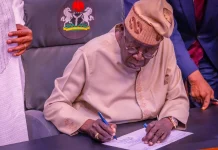Former Kogi State Governor Yahaya Bello is expected to be charged with money laundering on Thursday by the Economic and Financial Crimes Commission (EFCC).
Emeka Nwite, a judge of the Federal High Court in Abuja, is the one slated to perform the arraignment.
As per the EFCC’s statement on Wednesday, this “follows a warrant of arrest and enrolment order granted the EFCC by the court on Wednesday, 17 April 2024.”
On Wednesday, in an attempt to apprehend Mr. Bello, EFCC agents invaded his Abuja home.
The EFCC agents encountered intense resistance from police officers stationed at the former governor’s residence, which resulted in the arrest attempt failing.
After shining a spotlight on Mr. Bello and his family for years, the EFCC is now putting him on trial and charging him of money laundering involving over N80 billion.
The N10 billion money laundering allegations the commission brought against the former governor’s nephew Ali Bello and a co-defendant in 2022 were the product of its extensive probe into the previous governor.
A week or so after Mr. Bello’s term as governor ended on January 27, the EFCC revised the accusations that were still pending, increasing the number of counts against the younger Bello and his co-defendant, Dauda Suleiman, from 10 to 17.
The prosecution named former Governor Bello in one of the newly introduced counts as an accomplice, but not as a defendant.
In the count, the EFCC accused Mr Bello of conspiring with Ali Bello, Dauda Suleiman and Abdusalam Hudu to convert over N80 billion belonging to Kogi State to their personal use. The case, which has seen EFCC call witnesses to testify, is before Justice James Omotosho.
However, in what seems to be a new case, the EFCC charged Mr. Bello with 19 counts.
The identities of the same group of suspected accomplices from the previous case are also mentioned in the one that follows.
The approximately N80 billion in alleged transactions from the previous case is likewise a theme in the alleged charges.
However, rather than September 2015 as stated in the previous accusation, the commission has now changed the date of the alleged acts to February 2016, which is Mr. Bello’s first month in office as governor.
The EFCC filed a new lawsuit alleging that Mr. Bello, his nephew Ali Bello, Dauda Suleiman, and Abdulsalam Hudu—who is allegedly still at large—colluded to convert N80 billion (N80, 246,470, 088.88) in total in February 2016.
The EFCC claimed in the count that there was a criminal breach of trust and that Mr. Bello and others “reasonably ought to have known” that the money “forms part of the proceeds of your unlawful activity.”
In a separate charge, the EFCC said that Mr. Bello helped a company, E-Traders International Limited, conceal a total of more over N3 billion (N3,081,804,654) in account number 1451458080, which is registered with Access Bank Plc, between July 26, 2021, and April 6, 2022, in Abuja.
EFCC explained in the statement by its spokesperson, Dele Oyewale, that its “attempt to execute the warrant of arrest lawfully obtained against Bello met stiff resistance on Wednesday”.
It added: “The security cordon around the former governor’s residence in Abuja was breached by the current Governor of Kogi State, Usman Ododo, who ensured that the suspect was spirited away in his official vehicle.
The EFCC also cautioned against obstruction of its officers carrying out their lawful activities.
The commission issued the warning in a separate statement on Wednesday, as sighted by GTN it stated, it would not tolerate “any attempt by any person or organization to obstruct its operation as such will be met with appropriate punitive actions.”
The statement added: “Section 38(2)(a(b) of the EFCC Establishment Act makes it an offence to prevent officers of the Commission from carrying out their lawful duties. Culprits risk a jail term of not less than five years.
“This warning becomes necessary against the background of the increasing tendency by persons and groups under investigation by the Commission to take the laws into their hands by recruiting thugs to obstruct lawful operations of the EFCC.
“On several occasions, operatives of the Commission have had to exercise utmost restraint in the face of such provocation to avoid a breakdown of law and order. Regrettably, such disposition is being construed as a sign of weakness.”










